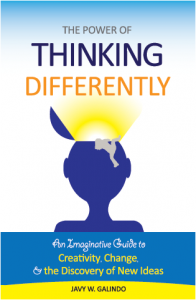Chapter 1 excerpt from The Power of Thinking Differently by Javy W. Galindo
From section entitled “How We Usually Think” (updated 1/18/09 from draft IIII)
—-
The easiest way to understand how we think is through an example.
SCENARIO: Imagine a man not unlike many other men. This particular man was born in 1952 and died in 1972. However, in 1972 he died at the age of 25. How is this possible?
Unless you are familiar with this scenario, you may find it a bit puzzling. In trying to understand it, many of us consider rationality as our most common and trustworthy intellectual tool. It provides us with a mechanism that many believe reduces our probability of error and heightens the quality of our decisions. Many of us also attempt to use the faculty of reason to generate fruitful ideas and to discredit bad ones. When we take action based on these rational faculties, there is a sense that we have consciously thought through scenarios, and this helps to alleviate some of our insecurities.
We often call our predominant mode of thinking “common sense”, attributing to it a universal quality. We believe it to be a tool that can be accessed and utilized by all in such a way where we all can attain the same perspectives and come to the same conclusions.
The truth is, what we consider common sense is not truly rational. And rational thinking is often the farthest thing from our most commonly used mode of thought. We often ask, “Why did he do that? That makes no sense.” But just because we don’t understand another person’s actions doesn’t make him or her any less rational than ourselves, and vice versa.
Instead of pure rationality, thinking is predominately governed by pattern recognition. We process new information by imposing meaning based on an assumed context and meaning rather than objective inspection. For example, when reading the words “man…born in 1952…dies in 1972…age 25” we assign them meaning by recognizing them as being similar to other patterns of words we have experienced in the past – other past understanding of those same words. These assumed contexts are so dominant that it can be difficult to find an alternative understanding of these words; ones that could make sense of the scenario.
Secondly, our judgments and decisions are often based on automatic rule of thumb responses to this information rather than on thorough, logical analysis. In other words, when you read the scenario you immediately came to a judgment about what it means; what it was saying. It was unconscious and habitual. You did not go through and carefully investigate all possible meanings. Your understanding was based on some instant rule of thumb response — the “common sense” understanding of those words.
It is because of our automatic assignment of meaning or quick judgments that many are unable to think of alternative ways of perceiving our initial scenario. This habitual pattern recognition enables us to react quickly to our environment, but it also limits our view of the world, our access to new ideas, and our access to unique solutions because of its propensity to reinforce pre-existing assumptions. The scientific basis for this is explored in detail in chapter 3.
We are creatures of habit, and too often we lack the necessary awareness and desire to break out of our thinking habits. Think of how difficult it is for some to try new foods or go to new restaurants. Think of how difficult it is to change a corporate culture or company process. Perhaps you have a family member or friend that has thoughts and opinions that seem outdated to you, or who seem to often behave as if they were on automatic — responding to the world without thinking. Or maybe you are that person.
If we really wanted to change global warming or the energy crises we would simply collectively decide to drive less, fly less, manufacture with cleaner processes, and decide to use environmentally safe products. But dominant patterns of behavior and dominant perceptions keep us doing the same things, even when they are not necessarily in our best interests.
We can feel the effects of this first-hand. Often times the human condition seems to be plagued by the dilemmas of our own minds. The seas of life often feel turbulent, full of stress, anxiety, fear, and frustration. Part of the problem stems from our thinking habits, as many of us make use of familiar mental tools to deal with the world, regardless of their appropriateness to the situation; like trying to use a hammer to tighten a bolt because the hammer worked so well with nails. To say it differently, square pegs don’t all fit in round holes just because they fit in square ones.
For example, control is necessary many times when we drive our cars, make our children wear jackets when it is cold, or cook our food so as to avoid food poisoning. However, this can lead to unnecessary frustration when we then attempt to control other people and how they think. We can become angered when we cannot control traffic the same way we control our radio dials when we are running late for an appointment. Turn green already!
Similarly, there are those who agonize over attaining external satisfactions. It could be that they feel incomplete without a new car, a new house, the latest technological gadget, an attractive partner, fashionable clothing, prestigious title, or any number of things. They follow a cycle of being stressed about not having them, anxious about the possibility of losing them, or find that these achievements provide little satisfaction and so crave more extravagant versions of them. In many ways, these people can be seen as believing that just as purchasing a burger and a beer provides satisfaction for their hunger and thirst, that all satisfactions can be achieved by searching outside oneself.
Though the desire for control and the craving of external satisfaction are appropriate traits for some situations, they obviously are not applicable to all. Unfortunately, we have a tendency to treat them as universal tools. It is akin to using a toothbrush to clean your car because it worked so well with your teeth, or a saw to cut ties with a relationship partner because it worked so well with lumber. Eventually, our misuse and overuse of these tools are bound to cause us anxiety, frustration, and pain.
—
Please leave comments, questions, and suggestions below.
You may also be interested in the previous section excerpt: The Time To Think Differently
… or in the following section excerpt: The Stories We Live By



Trackbacks/Pingbacks
Buy:SleepWell.Aricept.Acomplia.Prozac.Nymphomax.Advair.Lasix.Buspar.Zetia.Amoxicillin.Female Pink Viagra.Benicar.Lipothin.Cozaar.Ventolin.Lipitor.Zocor.Wellbutrin SR.Seroquel.Female Cialis….
…
BUY FASHION. TOP BRANDS: GUCCI, DOLCE&GABBANA, BURBERRY, DIESEL, ICEBERG, ROBERTO CAVALLI, EMPORIO ARMANI, VERSACE…